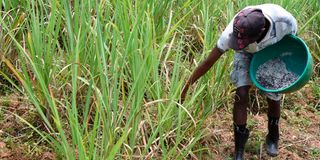Uncertainty for farmers and workers as sugar firms halt production

A farmer applies fertiliser to his sugar cane crop in Ikolomani, Kakamega County, in October last year. Leaders in the Western region have called for a speedy review and implementation of the sugar task force report.
Tough times lie ahead for farmers and workers in the Nyanza and Western Kenya sugar belts following the temporary suspension of production.
The decision by the Agriculture and Food Authority (AFA) to suspend sugar production in the country for more than four months is meant to allow for the maturation of sugar cane.
The regulator has given licensed millers until November 30 to resume operations following a consultative meeting held in Kisumu on July 13.
West Kenya and Olepito factories, run by the Rai family, have suspended crushing while the neighbouring Butali Sugar Mills will cease operations indefinitely from today. During this period, Butali’s managing director Sanjay Patel said they would carry out major maintenance.
“We take this opportunity to thank our loyal farmers for their continued support and look forward to resuming operations in the near future,” he said in a statement.
The fate of the workers remains unknown as the firm has not provided any information on the matter.
Annual leave
At West Kenya, with the exception of those working in critical areas, other employees will be required to take paid annual leave until July 31.
“The company will use this period to undertake a consultation process, after which you will be advised of the way forward, said the firm’s managing director Sohan Sharma.
He promised that the company would treat all employees with dignity and fairness during the period, noting that this was a temporary matter.
“We also wish to advise that this is a temporary measure which the company expects to normalise within the specified period, after which the company will return to normal operations. These are difficult times for everyone and the company, I ask for your support and cooperation so that we can emerge stronger once the situation normalises,” Mr Sharma said.
The shortage of cane since the beginning of the year has seen millers compete for whatever is available, resulting in the crushing of immature cane, thus reducing the quality of sugar produced.
“Apart from lowering the quality of the sugar on our shelves, harvesting the crop before maturity deprives farmers of the opportunity to maximise their profits due to the light weight,” said Michael Arum, coordinator of the Sugar Campaign for Change.
To keep the companies afloat, Kenya Union of Sugarcane Plantation and Allied Workers secretary-general Francis Wangara has called on the government to consider licensing the millers to import some of the 185,000 tonnes needed in the country.
“Out of this, the 16 licensed millers should be given a reserve of more than 50 per cent,” he said.
Maintain their workforce
Mr Wangara pointed out that the move will help millers maintain their workforce and meet other overheads, even as he urged millers not to retrench workers.
“Once they start producing, they will automatically stop importing. The country risks becoming a dumping ground if we leave this exercise to other traders,” he warned.
Further, Mr Wangara urged the national government, counties and millers to support farmers in cane development to sustain their operations.
Kenya Association of Sugarcane and Allied Products chairman Charles Atyang’ said that increasing credit to farmers will encourage mass production of sugar cane.
“Being a capital-intensive crop, most farmers lack the capacity to embark on large-scale production of sugar cane,” he said.





